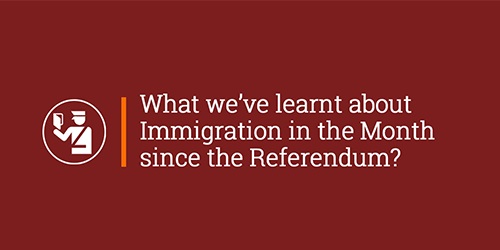What we’ve learnt about Immigration in the Month since the Referendum
In the months leading up to the EU Referendum, and indeed, in the weeks following the UK’s decision to leave, we’ve hardly seen a day pass without some form of political or media discussion regarding immigration. On the one hand we’ve seen immigration to the UK criticised for putting strain on schools and public services and on the other praised for its economic benefits. Perhaps the UK’s view on immigration is best displayed through the 48-52 referendum result that saw the UK vote to leave the European Union.
How the Brexit will affect UK immigration in the long term is still yet to be seen, but with national Law Firm Simpson Millar reporting a huge surge in enquiries to immigration solicitors from concerned businesses and individuals, perhaps the uncertainty itself is having an effect on the UK already.

Here’s what we’ve learnt about immigration in the month since Brexit:
Heightened uncertainty may lead to decreases in immigration before any new controls or stricter rules are implemented
A report from the Social Market Foundation published on 18 July suggests that ‘migration tends to fall when unemployment rises’ and that subsequently, in the current uncertain climate, immigration to the UK could fall before any post-Brexit immigration policies are even put into place. The report even goes as far as to forecast that immigration could fall to ‘162,000 by 2018’ and as low as ‘131,000 in 2020’.
The UK probably will not use an Australian style point system
Referred to tirelessly throughout the leave campaign, and a favourite talking point of Johnson and Gove, an ‘Australian style point system’ has been called for widely with the aim of decreasing the number of ‘unskilled’ and non-English speaking migrants entering the country. However, speaking to the Guardian, James Brokenshire, a close ally of Theresa May, claimed ‘It is not necessarily that the points-based system is the right way to do it. There are other arrangements that could be considered as well’, surely casting doubts into the minds of those hoping for stricter immigration policies.
The Government are under serious pressure over their policy of reducing net immigration to the “tens of thousands”
‘Brexit means Brexit’ insisted Theresa May, as she launched her campaign to be Conservative leader. Now as Prime mister, the weight of the Government’s policy to reduce net immigration to the tens of thousands rests on her shoulders; a load made all the more arduous by the UK’s decision to leave the EU. The report from the Social Market Foundation mentioned earlier actually forecasts that Theresa May might actually be able to achieve what David Cameron failed to and meet the target. Despite this, recent events such as Home Secretary, Amber Rudd, refusing to confirm whether the government will still aim to reduce net immigration below 100,000 displays clear signs of hesitance towards setting targets that they clearly believe they cannot achieve.
LawBid connects clients with Immigration specialists nationwide, so if you have an immigration matter that you would like to discuss, post your case and find a solicitor today.

